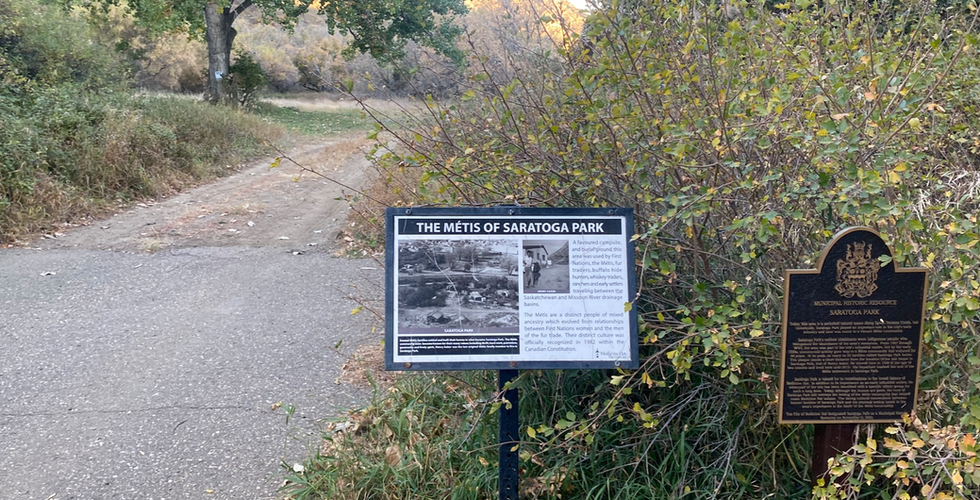Embracing Indigenous Tourism Can Bring in Much Needed Dollars
- allardkg
- Oct 7, 2025
- 4 min read
We in Medicine Hat speak our city's name with reverence, drawn from a rich Blackfoot legend. We point to the World’s Largest Tepee as a point of pride. But these gestures feel increasingly hollow when we confront the uncomfortable truth: for decades, our city's story has been one of selective memory and active erasure—a practice that is not only a cultural loss but a significant economic misstep.
The resistance to honouring our full history is not new; it is embedded in the very landscape of our neighbourhoods. The current council's hesitation is merely the latest chapter in a long-standing failure that is causing us to miss out on one of the fastest-growing tourism sectors in Canada.
The Ross Glen Site: A History Literally Paved Over
The most glaring example is the Ross Glen archaeological site. In the early 1980s, a significant dig revealed a "medicine wheel-type of stone structure," tipi rings, and stone tools—a sacred site carbon-dated back centuries. Yet, by the 1990s, previous city councils made a conscious choice: they allowed a subdivision to be built directly on top of it.
Today, the Ross Glen neighbourhood is fully developed. There is no plaque, no mention on the city's website, and no indication that a site of immense cultural and spiritual significance lies beneath the homes and lawns. Not even one street is named to indicate any indigenous presence. The past wasn't just forgotten; it was buried. This was not an oversight; it was a policy of erasure.
A Current Council Continuing the Pattern
This legacy of neglect continues. As recently as this April, Owl News journalist Alex McCuaig reported that the current "City councillors continue to resist acknowledging Indigenous campsite discovery." The article details a new archaeological find—a campsite used for millennia—that the present council delayed officially recognizing for years after the discovery in 2023. All the public heard was that there was delays with the work at the water treatment plant but we were not told why. The City received this report in 2024, well voer a year before they offically recognized it.
This is a choice to repeat the mistakes of the past. It is a choice to ignore professional archaeologists and Indigenous voices. The reluctance to even acknowledge a discovery, for fear of "opening Pandora's box," proves that the mindset that paved over Ross Glen is still alive in City Hall today.
The Story of Saratoga Park: A Token Gesture
The previous council took a step in the right direction by designating Saratoga Park—a vibrant Metis community home to five generations—as a Municipal Historic Resource. The city's own Saratoga Park Integrity Evaluation confirms its profound significance.
Yet, the commemoration has been tokenistic. The plaque was installed but there is no wayfinding, no indication of where the settlement actually was. For a community that existed until 2010, this treatment is a powerful symbol: we will grant you a plaque, but we will not fully integrate your story into our city's identity. It is a checkmark, not a commitment.
The Missed Economic Opportunity: The Power of Indigenous Tourism
This failure isn't just a cultural loss; it's an economic one. According to the Indigenous Tourism Association of Canada, this sector was one of the fastest-growing in the nation before the pandemic, with visitors spending billions annually.
Towns and cities across Canada are capitalizing on this. They are building partnerships, creating Indigenous-led tours, and developing cultural centres. They are reaping the economic benefits while we, with our unparalleled name and heritage, watch from the sidelines. We have started doing that but we could do so much more.
We have the foundational elements: a legendary name, significant archaeological sites, a living Métis history, and the world's tallest tepee. By leaving our stories buried and our plaques hidden, we are not just disrespecting our heritage—we are turning away visitors, revenue, and a chance to build a truly unique and sustainable tourism economy.
The Path Forward: A New Covenant with Our History
As a candidate for City Council and a journalist who has reported on these issues, I believe we must break this cycle. We cannot change the decisions of past councils, but we can choose a new path forward. We must:
Publicly Acknowledge the Truth: Begin with an official recognition of the Ross Glen site and the campsite that was discovered two years ago. We must be honest about what was lost and what we still have a chance to protect.
Build on the Foundation: Add to the work of the previous council by fully realizing the potential of the Saratoga Park designation with proper wayfinding, signage, and interpretation.
Partner with Local First Nations and Métis Communities: Let Indigenous leadership guide the telling of their own history, including how we memorialize sites like Ross Glen.
Invest with Dignity: Install professional interpretive infrastructure for the Saamis archeological site below the tepee and any future protected discoveries.
Champion Indigenous Public Art: Fund and install art that reflects the true spirit of this land, countering the narrative of erasure with one of celebration. Indigenous art adds to the interest and beauty of towns and cities.
Honour Tradition Ceremonially: Currently new councils are piped in by a lone piper. The Scottish part of me loves the sound of bagpipes but this denies our own First Nations /Metis heritage of our city. I would like to see this colonial tradition replaced with one that is authentic to this land.
Develop an Indigenous Tourism Strategy: Work with tourism operators and Indigenous partners to create authentic experiences—from cultural tours of these historic sites to Indigenous food markets—that honour our past and secure our economic future.
Medicine Hat stands at a crossroads. We can continue the old path of erasure, or we can choose a new covenant with our history—one of honesty, respect, and reconciliation. It's time for a council that sees our Indigenous heritage not as an inconvenience to be buried, but as our greatest story to be told and our most promising opportunity to be seized. Let’s choose to tell it.

























Comments